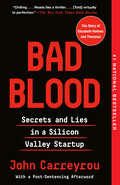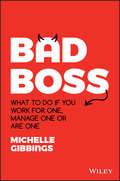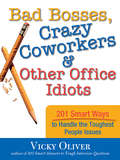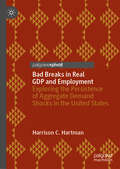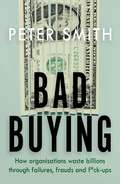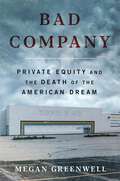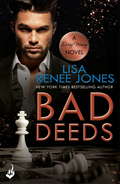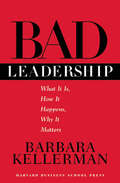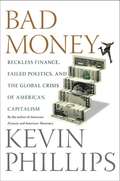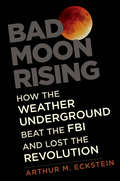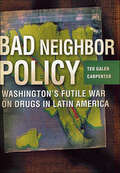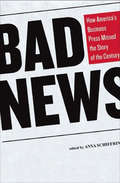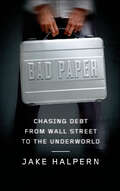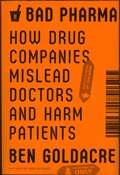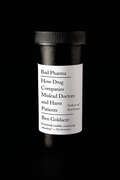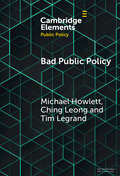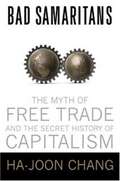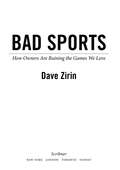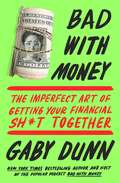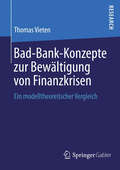- Table View
- List View
Bad Blood: Secrets and Lies in a Silicon Valley Startup
by John Carreyrou<P>The full inside story of the breathtaking rise and shocking collapse of Theranos, the multibillion-dollar biotech startup, by the prize-winning journalist who first broke the story and pursued it to the end, despite pressure from its charismatic CEO and threats by her lawyers. <P>In 2014, Theranos founder and CEO Elizabeth Holmes was widely seen as the female Steve Jobs: a brilliant Stanford dropout whose startup "unicorn" promised to revolutionize the medical industry with a machine that would make blood testing significantly faster and easier. <P>Backed by investors such as Larry Ellison and Tim Draper, Theranos sold shares in a fundraising round that valued the company at more than $9 billion, putting Holmes's worth at an estimated $4.7 billion. <P>There was just one problem: The technology didn't work. <P>A riveting story of the biggest corporate fraud since Enron, a tale of ambition and hubris set amid the bold promises of Silicon Valley. <P><b>A New York Times Bestseller</b>
Bad Boss: What to Do if You Work for One, Manage One or Are One
by Michelle GibbingsIn a tough or toxic work environment, are you brave enough to challenge your own thinking and shift your own perspective to make relationships work? Bad Boss is for anyone who is in — or who is keen to avoid — a negative workplace environment characterised by ineffective leadership. Believe it or not, bad bosses are not bad people, and there are concrete steps you can take to improve your situation. Inside, author Michelle Gibbings shares wisdom drawn from decades in corporate leadership. It takes teamwork at every level to create an environment where everyone can flourish. If you dare to examine your own role in your current situation and take action today, you stand to gain better relationships and greater career satisfaction. Challenge the standard leadership practices and transform a tough situation to the benefit of all. Learn how to: determine where the problem really lies identify your role in the bad boss situation strategise your best option forward take action using concrete tools reflect and monitor progress for long-term gain. Bad Boss will take the edge off your stressful work environment and provide you with key actionable steps to turn things around.
Bad Bosses, Crazy Coworkers & Other Office Idiots: 201 Smart Ways to Handle the Toughest People Issues
by Vicky OliverHave you confronted any of these coworkers or bosses recently? The Grumpy Martyr The Boss's Pet The Credit SnatcherBad Bosses, Crazy Coworkers & Other Office Idiots is designed to help people with all their office issues, from an exasperating coworker to a boss from hell. This book helps readers quickly pinpoint their problems and implement immediate tactics to resolve them.Vicky Oliver has helped more than 5,000 working people at different levels in different fields resolve their work problems by dealing with bad behavior and problem people. Bad Bosses, Crazy Coworkers & Other Office Idiots is a direct result of what she has learned as a career expert who has made herself available to help people in their times of need.With this book in hand, readers will have the answers to all their difficult work issues and will see their job satisfaction skyrocket.With this book in hand, readers will have the answers to all their difficult work issues and will see their job satisfaction skyrocket.
Bad Boy Ballmer: The Man Who Rules Microsoft
by Fredric Alan MaxwellIn Jan. 2000 Bill Gates gave his responsibilities & the title CEO of Microsoft to his best friend, Steve Ballmer, who had been at Gates's side almost since the company's earliest days. Ballmer's life is an incredible story of tremendous ambition, genius, arrogance, & charisma. This enlightening biography -- based on in-depth study & interviews with former Microsoft insiders -- provides the complete, controversial narrative of one of the technology industry's most influential & talked-about figures. It is also the definitive story of the Bill Gates/Steve Ballmer relationship, from their 1974 meeting at a Harvard dorm. The book shows how Ballmer & Gates work together & provides a revealing look at one of the masterminds of the technological age.
Bad Breaks in Real GDP and Employment: Exploring the Persistence of Aggregate Demand Shocks in the United States
by Harrison C. HartmanWhy do policymakers allow economies to settle into a “new normal” after a bad break in the economy rather than try to return the economy to its previous trend? In this book, economist Harrison C. Hartman discusses some of the variables that impact a nation’s ability to recover from negative aggregate demand shocks. Spanning total real GDP, per capita real GDP, and nonfarm payroll employment in the USA, the book emphasizes the role of aggregate demand shocks in causing the US economy to fail to return to trend. The resulting book challenges modern mainstream macroeconomic theories and highlights the complexities of post-recession recovery. The chapters provide econometric evidence both for and against the impact of aggregate demand on real GDP and employment levels in the long run. Hartman studies modern macroeconomic theories related to economic resilience and demand using (a) the velocity of money and the equation of exchange and (b) econometric analysis to dissect modern macroeconomic theories related to economic resilience and demand. The book provides methods to estimate and evaluate trends, and after simple methods for estimating trend and discussing associated results, the book turns attention to model selection, hypothesis testing and further results. This book also offers some possible areas for future work. A thought-provoking exploration of economic recovery or lack thereof, the book covers aggregate demand, employment, real GDP, and economic theories (classical, Keynesian, monetarist, neoclassical, new-Keynesian, and post-Keynesian perspectives). Bad Breaks in Real GDP and Employment is a timely and essential guide for economists navigating the complexities of past, present, and future macroeconomic landscapes. It explains the functionality of aggregate demand in the context of economic recession, offering insight into why some AD shocks feel permanent. This book provides econometric evidence supporting Keynesian and post-Keynesian perspectives on the potential importance of aggregate demand in determining real GDP and employment levels in the long run, particularly in cases when real GDP and employment fail to recover fully after recessions. This book is one of few contemporary works (a) explicitly noting the economic importance of money velocity and (b) focusing on econometric analysis that at least at times supports post-Keynesian perspectives.
Bad Buying: How organisations waste billions through failures, frauds and f*ck-ups
by Peter Smith"A fascinating litany of the mistakes that can happen when buyers get it wrong" - Luke Johnson, The Sunday Times"Packed full with amazing examples' Jeremy Vine, BBC Radio 2"Colossal, costly disasters could be averted if those holding the purse strings read this book. - The TimesIn this hilarious, fascinating and insightful expose, industry insider Peter Smith reveals the massive blunders and dodgy dealings taking place around the world as private companies and public sector bodies buy goods and services. A recent report showed that over 90% of procurement projects fail. So, why are so many billions wasted on ineptitude, mismanagement and, in some cases, fraud? By turns an entertaining account of some of the worst procurement scams in history and also a resounding lesson in how not to operate, Bad Buying offers clear and practical advice on how to avoid embarrassing mistakes, minimise needless waste and make sound, strategic procurement decisions on your next initiative.'Had this been published pre-Covid, some of the recent f*ck-ups and waste might have been avoided. It's a must read for the public and private sector alike' Lt-Gen. Sir Andrew Gregory, SSAFA: The Armed Forces Charity 'Hilarious, enlightening and brilliant....This book will make you think twice about buying anything - but do buy this' Antonio Weiss, bestselling author of 101 Business Ideas That Will Change the Way you Work, and Director, The PSC
Bad Company: Private Equity and the Death of the American Dream
by Megan GreenwellA timely work of singular reportage and a damning indictment of the private equity industry told through the stories of four American workers whose lives and communities were upended by the ruinous effects of private equity takeovers.Private equity runs our country, yet few Americans have any idea how ingrained it is in their lives. Private equity controls our hospitals, daycare centers, supermarket chains, voting machine manufacturers, local newspapers, nursing home operators, fertility clinics, and prisons. The industry even manages highways, municipal water systems, fire departments, emergency medical services, and owns a growing swath of commercial and residential real estate.Private equity executives, meanwhile, are not only among the wealthiest people in American society, but have grown to become modern-day barons with outsized influence on our politics and legislation. CEOs of firms like Blackstone, Carlyle, KKR, and Apollo are rewarded with seats in the Senate and on the boards of the country’s most august institutions; meanwhile, entire communities are hollowed out as a result of their buyouts. Workers lose their jobs. Communities lose their institutions. Only private equity wins.Acclaimed journalist Megan Greenwell’s Bad Company unearths the hidden story of private equity by examining the lives of four American workers that were devastated as private equity upended their employers and communities: a Toys R Us floor supervisor, a rural doctor, a local newspaper journalist, and an affordable housing organizer. Taken together, their individual experiences also pull back the curtain on a much larger project: how private equity reshaped the American economy to serve its own interests, creating a new class of billionaires while stripping ordinary people of their livelihoods, their health care, their homes, and their sense of security.In the tradition of deeply human reportage like Matthew Desmond’s Evicted, Megan Greenwell pulls back the curtain on shadowy multibillion dollar private equity firms, telling a larger story about how private equity is reshaping the economy, disrupting communities, and hollowing out the very idea of the American dream itself. Timely and masterfully told, Bad Company is a forceful rebuke of America’s most consequential, yet least understood economic forces.
Bad Deeds: Dirty Money 3 (Dirty Money)
by Lisa Renee JonesWall Street meets Sons of Anarchy in Bad Deeds, the smouldering, scorching third novel in the explosively sexy Dirty Money series from New York Times bestseller Lisa Renee Jones, author of the Inside Out series.Would you bleed for the one you love?To save his family empire from the grip of a drug cartel, Shane Brandon is pushed to the edge of darkness. His brother only thought he knew what dirty meant. Shane is about to give it new meaning. But there is another battle brewing inside Shane, and it is to Emily Stevens he turns for escape. In every one of Shane's seductive demands, Emily can taste and feel his torment, his struggle to save his family and not lose himself. She can't just sit back and watch Shane become everything he hates. But she also fears that her own dangerous secret could be about to erupt - and be the cause of the Brandon family's undoing.In this war, blood will spill - and someone in the heart of the Brandon family will not survive...Are you ready to play by the hard rules of the Brandon family empire? Check out the other compelling novels in the Dirty Money series: Hard Rules and Damage Control.
Bad Leadership
by Barbara KellermanHow is Saddam Hussein like Tony Blair? Or Kenneth Lay like Lou Gerstner? Answer: They are, or were, leaders. Many would argue that tyrants, corrupt CEOs, and other abusers of power and authority are not leaders at all--at least not as the word is currently used. But, according to Barbara Kellerman, this assumption is dangerously naive. A provocative departure from conventional thinking, Bad Leadership compels us to see leadership in its entirety. Kellerman argues that the dark side of leadership--from rigidity and callousness to corruption and cruelty--is not an aberration. Rather, bad leadership is as ubiquitous as it is insidious--and so must be more carefully examined and better understood. Drawing on high-profile, contemporary examples--from Mary Meeker to David Koresh, Bill Clinton to Radovan Karadzic, Al Dunlap to Leona Helmsley--Kellerman explores seven primary types of bad leadership and dissects why and how leaders cross the line from good to bad. The book also illuminates the critical role of followers, revealing how they collaborate with, and sometimes even cause, bad leadership. Daring and counterintuitive, Bad Leadership makes clear that we need to face the dark side to become better leaders and followers ourselves. Barbara Kellerman is research director of the Center for Public Leadership and a lecturer in public policy at the Kennedy School of Government, Harvard University.
Bad Money: Reckless Finance, Failed Politics, and the Global Crisis of American Capitalism
by Kevin PhillipsThe financial sector has hijacked the American economy and put our global future at risk. Foreign policy has taken its toll as well. The dollar is losing value in the world because of America's fiscal irresponsibility and indebtedness, and the ruinous war in Iraq has severely eroded our influence over global oil producers and foreign central banks.
Bad Moon Rising: How the Weather Underground Beat the FBI and Lost the Revolution
by Arthur M. EcksteinA startling history of the forlorn war between the Weather Underground and the FBI, based on interviews and 30,000 pages of previously unreleased FBI documents In the summer of 1970 and for years after, photos of Bill Ayers, Bernadine Dohrn, Jeff Jones, and other members of the Weather Underground were emblazoned on FBI wanted posters. In Bad Moon Rising, Arthur Eckstein details how Weather began to engage in serious, ideologically driven, nationally coordinated political violence and how the FBI attempted to monitor, block, and capture its members--and failed. Eckstein further shows that the FBI ordered its informants inside Students for a Democratic Society (SDS) to support the faction that became Weather during the tumultuous June 1969 SDS convention, helping to destroy the organization; and that the FBI first underestimated Weather's seriousness, then overestimated its effectiveness, and how Weather outwitted them. Eckstein reveals how an obsessed and panicked President Nixon and his inner circle sought to bypass a cautious J. Edgar Hoover, contributing to the creation of the rogue Plumbers Unit that eventually led to Watergate.
Bad Neighbor Policy: Washington's Futile War on Drugs in Latin America
by Ted Galen CarpenterThe domestic phase of Washington's war on drugs has received considerable criticism over the years from a variety of individuals. Until recently, however, most critics have not stressed the damage that the international phase of the drug war has done to our Latin American neighbors. That lack of attention has begun to change and Ted Carpenter chronicles our disenchantment with the hemispheric drug war. Some prominent Latin American political leaders have finally dared to criticize Washington while at the same time, the U.S. government seems determined to perpetuate, if not intensify, the antidrug crusade. Spending on federal antidrug measures also continues to increase, and the tactics employed by drug war bureaucracy, both here and abroad, bring the inflammatory "drug war" metaphor closer to reality. Ending the prohibitionist system would produce numerous benefits for both Latin American societies and the United States. In a book deriving from his work at the CATO Institute, Ted Carpenter paints a picture of this ongoing fiasco.
Bad News: How America's Business Press Missed the Story of the Century
by Anya SchiffrinLeading scholars and journalists assess the media&’s failure to see the financial crisis coming. &“A sort of All the President&’s Men for our time&” (Kirkus Reviews). Where was the business press in the weeks and months leading up to the deepest financial crisis since the Great Depression? As our economy unraveled, journalists struggled to keep up with the story of the century, grappling with an alphabet soup of derivatives, backroom deals, and toxic financial instruments. But many fault the media itself for having helped to create the bubble in the first place. Did the press fail its mandate as an engine of truth by buying into the hubris and exuberance of the preceding decades? Bad News is a foundational text for navigating a controversy that will be studied for years to come. With contributions from leading journalists and academics—including Nobel Laureate Joseph Stiglitz, International Consortium of Investigative Journalists&’ senior editor Dean Starkman, and the New York Times&’ European economics correspondent Peter S. Goodman—this collection presents a complex debate in a highly accessible format for anyone from curious readers and scholars to journalists themselves. And ultimately, the questions it raises illuminate the heated debate about the media&’s role as guardians of our democracy. &“There are three 24-hour financial networks. All their slogans are like, &‘We know what&’s going on on Wall Street.&’ But then you turn it on during the crisis, and they&’re like, &‘We don&’t know what&’s going on.&’ It&’d be like turning on the Weather Channel in a hurricane and they&’re just doing this: [shuddering] &‘Why am I wet?! What&’s happening to me? And it&’s so windy!&’&” —Jon Stewart &“Thorough, hard-hitting, and admirably balanced.&” —James Ledbetter, editor in charge, Reuters
Bad Paper: Chasing Debt from Wall Street to the Underworld
by Jake HalpernThe Federal Trade Commission receives more complaints about rogue debt collecting than about any activity besides identity theft. Dramatically and entertainingly, Bad Paper reveals why. It tells the story of Aaron Siegel, a former banking executive, and Brandon Wilson, a former armed robber, who become partners and go in quest of "paper"—the uncollected debts that are sold off by banks for pennies on the dollar. As Aaron and Brandon learn, the world of consumer debt collection is an unregulated shadowland where operators often make unwarranted threats and even collect debts that are not theirs.Introducing an unforgettable cast of strivers and rogues, Jake Halpern chronicles their lives as they manage high-pressure call centers, hunt for paper in Las Vegas casinos, and meet in parked cars to sell the social security numbers and account information of unsuspecting consumers. He also tracks a "package" of debt that is stolen by unscrupulous collectors, leading to a dramatic showdown with guns in a Buffalo corner store. Along the way, he reveals the human cost of a system that compounds the troubles of hardworking Americans and permits banks to ignore their former customers. The result is a vital exposé that is also a bravura feat of storytelling.
Bad Pharma: How Drug Companies Mislead Doctors And Harm Patients
by Ben GoldacreWe like to imagine that medicine is based on evidence and the results of fair testing and clinical trials. In reality, those tests and trials are often profoundly flawed. We like to imagine that doctors who write prescriptions for everything from antidepressants to cancer drugs to heart medication are familiar with the research literature about a drug, when in reality much of the research is hidden from them by drug companies. We like to imagine that doctors are impartially educated, when in reality much of their education is funded by the pharmaceutical industry. We like to imagine that regulators have some code of ethics and let only effective drugs onto the market, when in reality they approve useless drugs, with data on side effects casually withheld from doctors and patients. All these problems have been shielded from public scrutiny because theyre too complex to capture in a sound bite. But Ben Goldacre shows that the true scale of this murderous disaster fully reveals itself only when the details are untangled. He believes we should all be able to understand precisely how data manipulation works and how research misconduct in the medical industry affects us on a global scale. With Goldacres characteristic flair and a forensic attention to detail, "Bad Pharma "reveals a shockingly broken system and calls for regulation. This is the pharmaceutical industry as it has never been seen before.
Bad Pharma: How Drug Companies Mislead Doctors and Harm Patients
by Ben GoldacreWe like to imagine that medicine is based on evidence and the results of fair testing and clinical trials. In reality, those tests and trials are often profoundly flawed. We like to imagine that doctors who write prescriptions for everything from antidepressants to cancer drugs to heart medication are familiar with the research literature about a drug, when in reality much of the research is hidden from them by drug companies. We like to imagine that doctors are impartially educated, when in reality much of their education is funded by the pharmaceutical industry. We like to imagine that regulators have some code of ethics and let only effective drugs onto the market, when in reality they approve useless drugs, with data on side effects casually withheld from doctors and patients. All these problems have been shielded from public scrutiny because they're too complex to capture in a sound bite. But Ben Goldacre shows that the true scale of this murderous disaster fully reveals itself only when the details are untangled. He believes we should all be able to understand precisely how data manipulation works and how research misconduct in the medical industry affects us on a global scale. With Goldacre's characteristic flair and a forensic attention to detail, Bad Pharma reveals a shockingly broken system and calls for regulation. This is the pharmaceutical industry as it has never been seen before.
Bad Profits, Good Profits, and the Ultimate Question
by Fred ReichheldBad profits choke off a company's best opportunities for true growth, they endanger its reputation, and alienate customers and demoralize employees. This chapter shows companies how to tell the difference between good and bad profits and asks the ultimate question that will determine the future of your business. This chapter was originally published as Chapter 1 of "The Ultimate Question: Driving Good Profits and True Growth."
Bad Profits, Good Profits, and the Ultimate Question: How "Net Promoter" Companies Thrive in a Customer-Driven World
by Fred Reichheld Rob MarkeyIn today's Web-savvy world, where negative word of mouth is instantly broadcast over a global PA system, companies are trying to stay competitive by focusing more closely on their customers. They want to attract the most talented employees, too, so they know they need to be mission driven. But despite all the effort managers everywhere have put into these twin tasks--focusing on customers and inspiring employees--there hasn't been much progress. Why? Because most companies are ruled by financial and accounting metrics; at the end of the day, they yield to the gravitational pull of short-term gains. The result is what author and world-renowned expert on loyalty economics Fred Reichheld and his Bain colleague Rob Markey call "bad profits"--profits earned at the expense of customer relationships. In this chapter, Reichheld and Markey use business stories pulled from the headlines--America Online, US Airways, Blockbuster--as classic examples of companies that relied on bad profits to spur growth, to disastrous effect. They contrast these "bad profit" examples with the stories of Amazon, the Vanguard Group, Zappos, eBay, Southwest Airlines, and Costco, all of which handled customer relationships so deftly that their customers became "promoters" instead of "detractors," generating good profits and sustainable growth. The chapter closes with an explanation of The Ultimate Question and a graphic that clearly shows who the industry leaders are when it comes to creating loyal customers.
Bad Public Policy: Malignity, Volatility and the Inherent Vices of Policymaking (Elements in Public Policy)
by Michael Howlett Tim Legrand Ching LeongPolicy studies assume the existence of baseline parameters – such as honest governments doing their best to create public value, publics responding in good faith, and both parties relying on a policy-making process which aligns with the public interest. In such circumstances, policy goals are expected to be produced through mechanisms in which the public can articulate its preferences and policy-makers are expected to listen to what has been said in determining their governments' courses of action. While these conditions are found in some governments, there is evidence from around the world that much policy-making occurs without these pre-conditions and processes. Unlike situations which produce what can be thought of as 'good' public policy, 'bad' public policy is a more common outcome. How this happens and what makes for bad public policy are the subjects of this Element. This title is also available as Open Access on Cambridge Core.
Bad Samaritans: The Myth of Free Trade and the Secret History of Capitalism
by Ha-Joon Chang[From the book jacket] With irreverent wit, an engagingly personal style, and a battery of real-life examples, Ha-Joon Chang blasts holes in the "World Is Flat" orthodoxy of Thomas Friedman and other neo-liberal economists who argue that only unfettered capitalism and wide-open international trade can lift struggling nations out of poverty. On the contrary, Chang shows, today's economic superpowers-from the United States to Britain to his native South Korea-all attained prosperity by shameless protectionism and government intervention in industry. We in the wealthy nations have conveniently forgotten this fact, telling ourselves a fairy tale about the magic of free trade and-via our proxies such as the World Bank, International Monetary Fund, and World Trade Organization-ramming policies that suit ourselves down the throat of the developing world. Unlike typical economists who construct models of how economies are supposed to behave, Chang examines the past: what has actually happened. His pungently contrarian history demolishes one pillar after another of free-market mythology. We treat patents and copyrights as sacrosanct-but developed our own industries by studiously copying others' technologies. We insist that centrally planned economies stifle growth-but many developing countries had higher GDP growth before they were pressured into deregulating their economies.
Bad Sports
by Dave ZirinA THOUGHT-PROVOKING LOOK AT THE BIG BUSINESS AND IMMORAL PRACTICES BEHIND PROFESSIONAL SPORTS BY ACCLAIMED SPORTSWRITER DAVE ZIRIN, HAILED AS THE "CONSCIENCE OF AMERICAN SPORTSWRITING" (THE WASHINGTON POST )The fastest-growing sector of today's sports audience is the alienated fan. Complaints abound: from inflated ticket prices, $6 hot dogs, and $9 beers to owners endlessly demanding new multimillion-dollar stadiums funded by public tax dollars. Those sitting in the owners' boxes are increasingly placing profit over players' performances and fan loyalty. Bad Sports cuts through the hype and bombast to zero in on tales of abusive, dictatorial owners who move their teams thousands of miles away from their fan base, use their stadiums as religious and political platforms, or hold communities ransom for millions of dollars of taxpayer money to fund their gargantuan stadiums.As the multibillion-dollar sports-industrial complex continues to lumber along, Dave Zirin is the voice in the wilderness, speaking out for the common fan with a tough, passionate, and intelligent voice that will remind readers that there is more to sportswriting than glowing athlete profiles.
Bad Time Stories
by Charles Keim Yonatan ReshefThe 1990s and 2000s were especially difficult decades for government-public sector union relations in Canada. Rising costs and growing debts meant that governments were on the lookout for savings, and public sector unions and employees were easy targets for government actions. Bitter conflicts between unions and governments erupted and each labour dispute involved numerous rounds of public rhetoric in which both sides attempted to justify their actions and stigmatize their opponents.In Bad Time Stories, Yonatan Reshef and Charles Keim analyse the language of both parties in order to identify the legitimation strategies at work during government-union conflict. The authors use evidence drawn from newspapers, speeches, parliamentary transcripts, and legal statements in presenting a new framework for understanding the discursive strategies employed by governments and unions in labour disputes.Using a case study and linguistic approach, Bad Time Stories offers a unique perspective on industrial relations and will be of interest to scholars in the areas of business, public policy, and communications, as well to those directly involved in union-management negotiations.
Bad with Money: The Imperfect Art of Getting Your Financial Sh*t Together
by Gaby Dunn&“Humorous and forthright...[Gaby] Dunn makes facing money issues seem not only palatable but possibly even fun....Dunn&’s book delivers.&” —Publishers Weekly The beloved writer-comedian expands on his popular podcast with an engaging and empowering financial literacy book for Millennials and Gen Z. In the first episode of his Bad With Money podcast, Gaby Dunn asked patrons at a coffee shop two questions: First, what&’s your favorite sex position? Everyone was game to answer, even the barista. Then, she asked how much money was in their bank accounts. People were aghast. &“That&’s a very personal question,&” they insisted. And therein lies the problem. Dunn argues that our inability to speak honestly about money is our #1 barrier to understanding it, leading us to feel alone, ashamed, and anxious, which in turns makes us feel even more overwhelmed by it. In Bad With Money, he reveals the legitimate, systemic reasons behind our feeling of helplessness when it comes to personal finance, demystifying the many signposts on the road to getting our financial sh*t together, like how to choose an insurance plan or buy a car, sign up for a credit card or take out student loans. He speaks directly to her audience, offering advice on how to make that #freelancelyfe work for you, navigate money while you date, and budget without becoming a Nobel-winning economist overnight. Even a topic as notoriously dry as money becomes hilarious and engaging in the hands of Dunn, who weaves his own stories with the perspectives of various comedians, artists, students, and more, arguing that—even without selling our bodies to science or suffering the indignity of snobby thrift shop buyers—we can all start taking control of our financial futures.
Bad-Bank-Konzepte zur Bewältigung von Finanzkrisen: Ein modelltheoretischer Vergleich
by Thomas VietenIn diesem Buch wird ein Modell entwickelt, das zwei Bad-Bank-Konzepte miteinander vergleicht: auf der einen Seite wird eine vollständiger Verkauf von toxischen Aktiva, die eine Bank besitzt, an eine staatliche Bad Bank untersucht, auf der anderen Seite eine Transaktion, die einer Rückkaufvereinbarung gleicht, analysiert. In beiden Konzepten lässt sich ein kritischer Wert berechnen, zu dem ein Bankmanager bereit ist, die toxischen Aktiva abzugeben. Durch Teilnahme an diesen Konzeptenverbessert sich die Solvenzwahrscheinlichkeit der Bank und sie kann neueKredite vergeben. Deshalb eignen sich beide Bad-Bank-Konzepte dazu, dieFinanzstabilität wiederherzustellen und eine Kreditklemme zu vermeiden. Allerdings unterscheiden sich die erwarteten Kosten für die Steuerzahler
Badges without Borders: How Global Counterinsurgency Transformed American Policing (American Crossroads #56)
by Stuart SchraderFrom the Cold War through today, the U.S. has quietly assisted dozens of regimes around the world in suppressing civil unrest and securing the conditions for the smooth operation of capitalism. Casting a new light on American empire, Badges Without Borders shows, for the first time, that the very same people charged with global counterinsurgency also militarized American policing at home. In this groundbreaking exposé, Stuart Schrader shows how the United States projected imperial power overseas through police training and technical assistance—and how this effort reverberated to shape the policing of city streets at home. Examining diverse records, from recently declassified national security and intelligence materials to police textbooks and professional magazines, Schrader reveals how U.S. police leaders envisioned the beat to be as wide as the globe and worked to put everyday policing at the core of the Cold War project of counterinsurgency. A “smoking gun” book, Badges without Borders offers a new account of the War on Crime, “law and order” politics, and global counterinsurgency, revealing the connections between foreign and domestic racial control.
